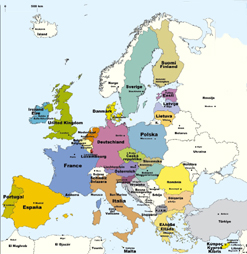The European Posse List and Working in Europe

There is an expanding need for temporary attorneys across Europe as many European companies and law firms have been adopting the use of temporary workers on a wider basis, as well as many U.S. companies and law firms which have applied the known U.S. model to their European operations. Much of this is attributable to the use of blocking statutes and the impact of European privacy laws (for explanations click here). Most projects are more appropriate for attorneys based in Europe or U.S. attorneys that have a “home base” in one of the busier markets (see paragraph 10 below).
These projects are often suitable for sole practioners based in Europe (many are special projects seeking EU law expertise) as well as stagiaires who have done a stint with any of the EU institutions
The first preference is always EU-based/EU admitted attorneys with multi-language ability.
A few general points on European project work:
1. Most of the projects require experience in electronic discovery and require familiarity with various electronic document review software (for background click here).
2. Complete fluency in a European language in addition to English is often required although there are projects where English may be the only language in a document review such as UK projects.
3. Due to work permit issues, all European-based projects require that you be a national of one of the 27 EU countries or hold nationality with an EEC country, or be qualified to work via a work permit or otherwise.
4. If you are a licensed U.S. attorney who has passed the QLTT examination you will be able to work on any UK based project, and you may be able to work on projects on the Continent depending on the country’s rules.
5. Some agencies are incorporated in several EU jurisdictions. As a result, they often obtain work permits for select non-EU candidates who have an extensive background in a subject matter a client needs. However, you must also have the language described in paragraph 2 above.
6. If you are a licensed U.S. attorney who has passed the QLTT examination and you are a European national, you will also have the right to apply to practice under the provisions of the Lawyer’s Directive in all EU member States.
7. For most UK projects you will have the usual payroll/tax deduction structure. However on the Continent you are often employed as a full “independent consultant” and are therefore paid gross rates (no tax deductions) and are responsible for your own taxes. Most attorneys have a VAT number of and/or an attorney registration number.
8. In almost all cases now, due to the growing base of local contract attorneys, projects do not provide housing/per diems although there are some projects that do provide housing and per diems.
9. As regards hourly rates, in the past year we have seen hourly rates between €25 to €40 for most projects (₤20 to ₤25 in the UK) depending on the nature of the project. In many cases, a work week is 50 hours before OT takes effect, rather than after 40 hours.
10. The majority of project work is in London and Brussels, but Amsterdam, Frankfurt, Luxembourg, and Paris have all seen an increasing number of projects.
